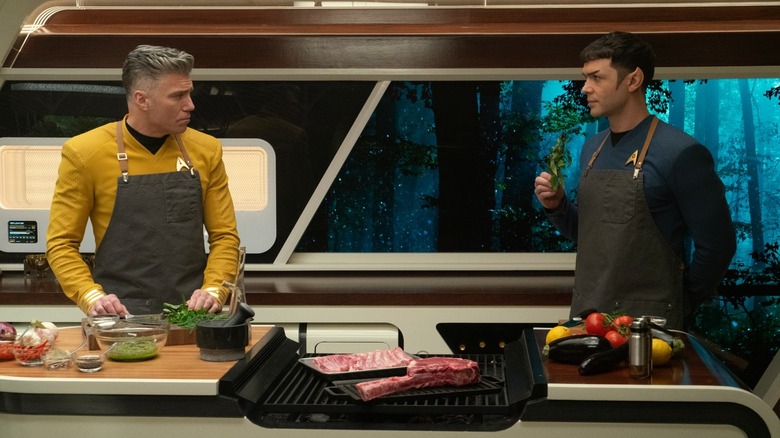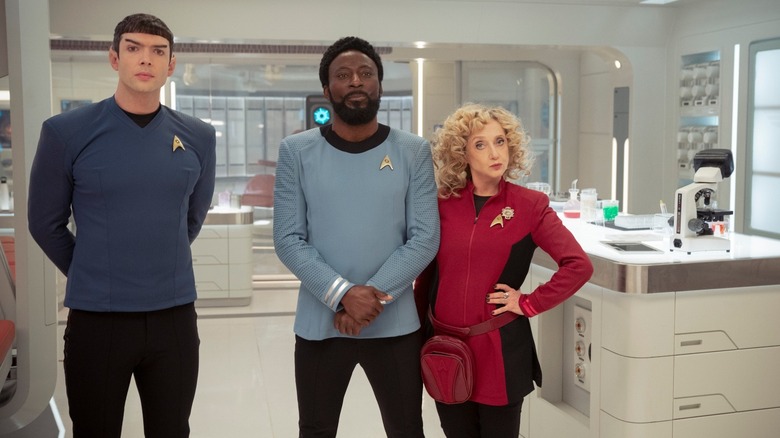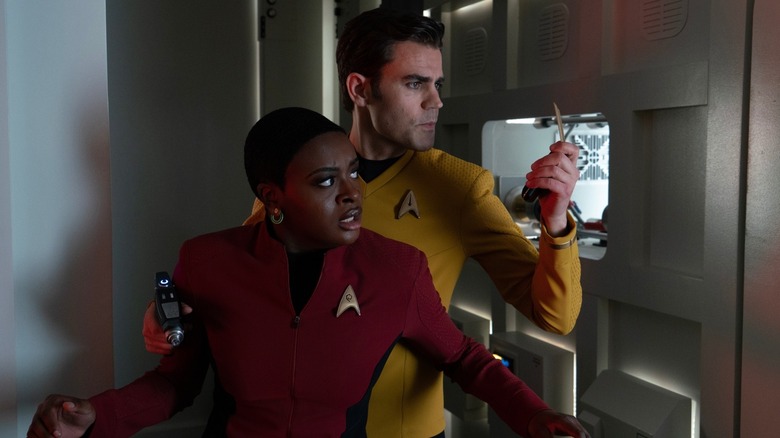One Legendary Star Trek Writer Loves Strange New Worlds As Much As You
Since the launch of CBS All Access — which is now called Paramount+ — in 2017, Paramount has debuted a massive spate of new "Star Trek" shows. This began with "Star Trek: Discovery," followed quickly by "Star Trek: Short Treks," the "Next Generation" throwback "Star Trek: Picard," the two animated shows "Star Trek: Lower Decks" and "Star Trek: Prodigy," and the Enterprise-set "Discovery" spinoff "Star Trek: Strange New Worlds." There was also a collection of animated shorts called "Very Short Treks."
As of this writing, only "Star Trek: Strange New Worlds" and "Star Trek: Lower Decks" have new episodes forthcoming. This is in addition to a TV movie called "Star Trek: Section 31," set for release in 2025, and a series called "Starfleet Academy," which is currently in development.
The new wave of "Trek" shows has caused no small amount of controversy among fans, with Trekkies arguing that some of them are the "good" ones and some are the "bad" ones. I, myself, have been sharply critical of "Discovery" and "Picard," but very open in my praise of "Lower Decks" and "Strange New Worlds." Indeed, one might find a general consensus that "Strange New Worlds" is one of "the good ones"; it is certainly one of the better reviewed. Many responded dramatically to the show's episodic format, affable tone, and inclusion of fan-favorite "Star Trek" characters like Captain Pike (Anson Mount) and Spock (Ethan Peck).
A notable celebrity in the "Star Trek" world who also likes "Strange New Worlds" is Ronald D. Moore, a regular writer on "Star Trek: The Next Generation," a writer/producer on "Star Trek: Deep Space Nine," and a brief participant on "Star Trek: Voyager." Moore recently talked with CinemaBlend about the current state of "Star Trek," revealing that he has become enamored with "Strange New Worlds."
Moore wants to return to the Star Trek universe
Firstly, Moore dropped the bomb that he would be interested in returning to "Star Trek" at some point, which would be a coup for Trekkies. Moore was one of the few showrunners and writers who directly oversaw the 1990s "Star Trek" renaissance, which has come to define the franchise in the decades since. He was invited onto "Star Trek: Voyager" late into its run (he was finishing the concurrent "Deep Space Nine"), and he ended up butting heads with prolific writer Brannon Braga. Moore also wanted to make "Voyager" into a longer-form, serialized series, but his ideas were all shot down; it was more important to the show's producers that the series be readable in syndication.
As such, Moore left the "Star Trek" franchise to work on his beloved reboot of "Battlestar Galactica." He would later develop the series "Outlander" and co-create the acclaimed sci-fi show "For All Mankind." That he wants to come back to "Star Trek" in any capacity should be exciting for Trekkies everywhere. As Moore put it:
"It's always one of those things that is in the back of my mind. It'd be fun to go back and do something again before my career is over. It's in such good hands, you know, they've been doing a great job with it. So they don't need me, but it would be fun to go do something eventually."
And, yes, the "great job" is a reference to "Strange New Worlds" specifically. Ironically, the element of "Worlds" that had attracted Moore the most is its episodic format. "Discovery" and "Picard" were serialized, which was originally Moore's vision for "Voyager." However, he appreciated that great stories could still be told in the one-and-done structure. Trekkies will happily debate which approach is more effective for the franchise.
Serialized vs. episodic Star Trek
Moore recognized that he wanted to make his shows more serial in nature, but that a good episodic show is still a good show. "Strange New Worlds" has been very graceful in allowing its characters to grow and change and be repeatedly established, all while telling new kinds of stories every week. Indeed, "Strange New Worlds" is practically a comedy series, given its frequently light tone, animated crossover episode, and musical episode.
Moore recognized this balance, saying:
"I think that to the serialization point, yeah, I was a big advocate of serializing it. But now you know, surprisingly, in that sense, 'Strange New Worlds' is more or less episodic. I've become very enamored of that show, and that formula and it does feel more in keeping with what the original started. They're able to strike that balance that we were talking about back in the day where you could do episodic structure but still continue character storylines."
The CinemaBlend interviewer asked Moore what kind of show he would pitch if given the opportunity to construct a "Deep Space Nine" sequel series. Moore hadn't thought that far ahead, other than to say that such an enterprise would "be fun." Several characters from "Deep Space Nine" returned for an episode of "Lower Decks," presenting the first appearance of the notable space station since the closure of its own series in 1999.
The current state of "Star Trek" seems to be one of contraction, however, with more shows ending than starting. If Moore is to rejoin the fray, as it were, one might safely predict he would step on board "Strange New Worlds" and not launch a brand-new nostalgia series.
"Star Trek: Strange New Worlds" season 3 is slated to premiere on Paramount+ in 2025.


